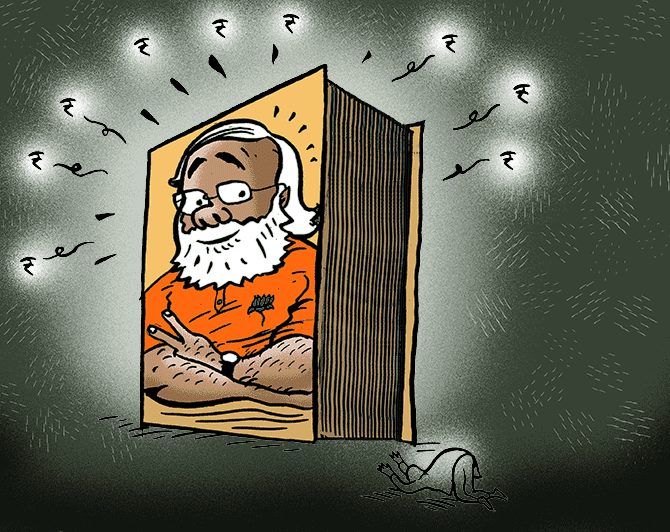'If Modi wants to help the poor and get the credit for it as well, he must do what China does. He must openly adopt pro-capital policies.'
'And -- this is critical -- he must remember that pro-capital does not mean pro-capitalist. That was the Congress way, which suppressed private capital in favour of public investment while promoting favoured capitalists at the expense of the public sector,' says TCA Srinivasa Raghavan.
Illustration: Dominic Xavier/Rediff.com

In July 2014, a single sentence from Rahul Gandhi that the Modi government was a suit-boot ki Sarkar -- a government of and for the rich -- threw the prime minister completely off-balance.
For the next five years, he focussed on ensuring that his government would not be seen as a government of the rich.
But now Mr Modi has delivered a handsome win for the Bharatiya Janata Party.
He is the unchallenged political leader of India.
There is, however, one challenge that still exists: His own mind, which is of a Left bent.
This is sad. So just as he exposed the fake secularism of the Congress, he must now banish its fake socialism which has affected him as well.
That means he must free himself of belief that a government must not be seen favouring capital.
Everyone knows India needs investment on a massive scale to remove poverty, and, by now, we also know that private investment is what will make that happen because in a capital-scarce country, it is the private sector -- barring the crooks -- that uses capital more efficiently.
This is the main reason why, if he wants to help the poor and get the credit for it as well, he must do what China does.
He must openly adopt pro-capital policies.
And -- this is critical -- he must remember that pro-capital does not mean pro-capitalist.
That was the Congress way, which suppressed private capital in favour of public investment while promoting favoured capitalists at the expense of the public sector.
What is to be done?
The economic history of the world shows that governments which favoured private capital delivered the highest rates of growth.
That’s why we need laws that don’t discriminate against capital as this is essential for widening and deepening it.
This is also something that China has done.
But since 1970 India has failed spectacularly in this regard.
It was doing quite well before that.
After 1970, however, policy focus shifted to politically motivated, Left-inspired re-distributive policies at the expense of investment and growth.
The 1983 book by Isher Ahluwalia described this perfectly.
Mr Modi did not dismantle these policies in his first term because he wanted to get re-elected.
He desperately wanted to avoid what had happened to Atal Bihari Vajpayee because of the India Shining campaign.
But now that he has been re-elected, he must take India back to the Nehruvian template of determinedly raising the level of investment, with one major difference: Nehru was forced to turn to State-led investment because the private sector threw up its hands.
But that is no longer the case and Mr Modi must go out of his way to assist it just as Nehru did with the public sector.
This should be Mr Modi’s landmark departure from the Nehruvian model.
All policies -- tax, imports, interest rates and exchange rates -- must be made private sector friendly.
The public sector must go, once and for all. It is an abhishaap, a curse.
This is not to say there must be no public investment. There must.
But it must be confined to building transport and social infrastructure as China has done.
Even the power sector, which the Congress thinks is infrastructure, must be privatised.
It is deadweight on the exchequers of the state governments.
And, again, as China has done, the money for this must come from a massive sale of government land to large private sector firms to build office and residential real estate, the demand for which, despite the ups and downs, is insatiable.
Moreover, it has a huge investment multiplier.
Turn right, Sahib
The short point is this: Mr Modi must now stop imitating the Congress. Ab bahut ho gaya. He must make a huge break with that model and go all out to support private capital.
He has already cleared the decks for that by emerging as the dominant partner in his relationship with the Rashtriya Swayamsevak Sangh, which is as statist as the Congress and the CPM (Communist Party of India-Marxist).
He should now get on with the job of making India a truly private enterprise-led economy.
In 2014, he used development as his main campaign appeal.
Then, having failed to rid his mind of socialist cobwebs and used capital most inefficiently, he had to use nationalism in his 2019 campaign.
But what will he do in 2024 if he fails to deliver what his main support group wants, namely, both jobs and work?
He can’t fool the voter twice.
That is why he needs to adopt the private sector politically.
He has the necessary marketing skills to sell the idea to the country.
Once he makes up his mind to do this, the rest is a matter of detail.
I am sure Mr Sam Pitroda will be happy to help with them, saying kiya toh kiya.











